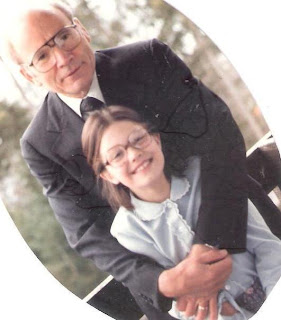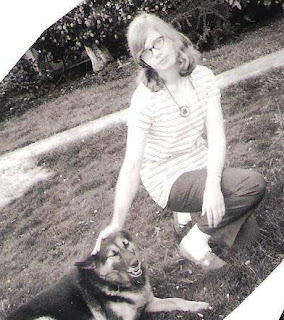MEMORIES
OF RAISING FOUR CHILDREN – PART III
Circa 1956 – 1984 – and beyond
By Dr. Robert E. Plucker
And
now to John, who can't avoid being special because he became the first boy in a
family collection of girls. There was Margaret, sister of Dorothy, only
children of Marcel and Margaret Madsen. "Little" Margaret had Holly.
Dorothy had Myra
 |
| Margaret with baby John in 1984 |
John's
birth story is partly in previous paragraphs, but some details need to be
mentioned here. First was all my worries about his being conceived at all, as I
had serious doubts about my willingness to take on fatherhood at my
"mature" age. Margaret and I had agreed that there were to be no
children in our marriage, as she had Holly, and I had Ginny and Dot. That was
enough, we thought. But Margaret loves children, and after some seven years,
she really wanted another child. I was scared. I was 55, and would be 56 before
the required time would be up. I was sure I was far too old to care for another
kid. Margaret was so determined, that one morning on the way to work I came
close to panic, and upon arriving I asked, no, begged Father Bill Forbes,
Episcopal priest, colleague and friend to counsel me. His wise words and the
encouragement of a wise old lady, Violet Moen at the Stanwood Lutheran church
gave me much comfort and some confidence. I was finally able to anticipate
John's arrival with true enthusiasm, not apprehension and outright fear. I
suspect the enthusiasm was cranked up some when the amniocentesis test
indicated "boy."
It
is only fair, however, to point out that daughter Dorothy already had broken
the spell, and presented me with a grandson, named Robert. Later people would
ask me if I intended to name our baby after me, and I would reply that I
couldn't, as my grandson had gotten the name first.
Margaret's
father's remarked when he came to visit in the hospital, "If only Paw
could have seen this!" Evidently Margaret's grandfather had gotten a bit
alarmed too, at the lack of boys.
When
John was perhaps two years old, I had taken him with me in the truck to do some
errand or other. We came back, stopped the truck in the driveway, set the
hand-brake, and I went a few steps away to greet Margaret, Holly or for some
other reason. All I remember is that I was close enough to watch with horror,
as the truck rolled backward down the driveway, crossed the road, crossed the
shallow ditch on the far side of the road, and finally came to a stop in the
vacant lot across the street from us, hung up on some stubborn small stumps of
alder that I had recently cut down to improve our view. The truck had good
speed to have gone that distance over such obstacles; it was too far gone
before I noticed what was happening for me to catch it and get it stopped.
We
still have this good old Toyota NAPA
 |
| John with Bob in 2012 |
John became a baseball
player, starting with the T-ball league and progressing upward to the Little
Leagues. Holly was responsible in part for this, because she had reminded me
that real fathers always played ball with their boys. So John and I started
playing ball on the driveway, the backstop being the garage door, using a short
length of 2X2 for a bat, and a good-sized beach ball. Later I got John a
genuine wood bat, and a left-hander's fielding glove.
Two
truly outstanding plays that I remember the most vividly happened in Little
League play. The first was a grand slam home run. John's face as he ran all the
way around the bases was pure delight, probably the equal of Holly's face when
she got to hold him as a new-born. The second was later, after he had become a
"seasoned" player, and before he got serious about soccer. In this
game, the opposing hitter slammed the ball a good bit further than anyone
expected, right over centerfielder John's head. He turned and chased the ball
down with his great speed, gathered it up and made a heroic left-handed throw
to Adam Cook, the catcher, who very coolly caught it, bent down and put out the
batter who had been sure he had a home run! Pandemonium from the spectators!
His
soccer games were equally exciting because he could outrun everyone he played
with, or against. But soccer, being a constantly moving game, did not present
so many truly memorable single plays. However, Margaret and I were converted to
being soccer fans.
And
there was music. Since Margaret and I were both teachers of music, and since he
was made to go to many of the concerts that I conducted, it was impossible for
him to escape music. The Skagit Community Choir was performing the Handel
Messiah when he was eight months old. He was in Margaret’s arms, sitting in the
rear of the audience, and he decided to join the choir. I did not notice any
sound from him at the time, as I was busy conducting, but Margaret said he was
making convincing efforts to sing, not cry. I could hardly believe it, but when
we played the tape recording of the concert, sure enough, there was the little
voice, singing right through the rest in the score.
 |
| Young John with his horn. |
When
he was in school, he liked listening to Benjamin Britten's "Young Person's
Guide to the Orchestra. He heard it many, many times and especially liked the
trumpet parts. The big ending was a favorite and he could sing and pretend to
play the trumpet along with the orchestra. The percussion parts were also a
favorite. When he got the chance, he took up the trumpet in school. The next
step was to borrow the school's (LaConner Public Schools) French horn, a single
horn in F. He played it almost immediately, apparently because nobody had ever
told him what a difficult and cranky instrument a horn is. When we moved to Alaska
The
first challenge with the new horn was when the LaConner school decided to
perform "Bye Bye Birdie". John was recruited to play in the small
orchestra, the only horn, and the only seventh grader amongst adult players. He
said he had been scared at the performances, but of course Margaret and I
thought he was perfect.
When
John was in sixth grade, he began to complain of a pain and a swelling in his
right ankle. He tried valiantly to ignore it and kept up his usual very active
life until one night he was to stay overnight with his friend Jonathan Windle.
When Jonathan's mother saw the hurting ankle and the large knob that appeared
to have grown significantly since we last saw it, she said we had jolly well
better come and pick up John and bring him directly to the emergency room at Skagit Valley
Hospital
He had a bone scan plus all
the other kinds of tests that they give. The frightening news was that they
would have to operate on this ankle to remove the growth, or this
"thing" would grow and cause the ankle bone itself to stop growing.
John had by no means attained his full growth, and an athletic fellow like him
should not have to deal with a lame leg for the rest of his life.
Dr.
West did the operation/procedure on John, and that went well, but managing the
dressing on the wound was another sickening affair. For a change, I was able to
watch without feeling faint while Dr. West examined the result of his work, and
changed the dressing over the next couple of days. Then came what seemed like
quarts of antibiotics that we were to administer at home. Home, at that time,
was sailboat Greta, I-dock at LaConner Marina. This went on for several weeks,
and ultimately, John was as good as new, playing baseball, soccer, running very
fast, and enjoying playing catch with me. It was not very long before he could
throw much harder than I could.
 |
| John |
 |
| Holly |
Present-day
thinking has it that children today have difficulty in school partly because
their parents move around so much that they rarely spend much time in one
school. The four kids of this essay either are exceptions to this thinking, or
perhaps they did stay long enough to establish themselves. Ginny started at
Alllouez kindergarten, first grade at Jackson
School , Green Bay ,
Dot joined her there, and together they progressed to Ft.
Howard school, Sandpoint
School in Seattle ,
then junior high and high school in Everett
 |
| Ginny and Dottie with Bob's mother, Dena |
Holly was more conventional,
going through kindergarten to high school graduation in Stanwood , Washington
Colleges?
Oh yes indeed.
Ginny:
Seattle U. ,
Everett Community, Edmonds Community, U.
of Washington , Seattle Pacific U.
Dot: ITT technical school,U.
of Washington
Dot: ITT technical school,
Holly:
Bryn Mawr
College and U. of Alaska
John:U. of Alaska Fairbanks, Victoria U. at Wellington
NZ, and Norway Academy
of Music in Oslo Norway
John:
A
regret of my later life is that these four children, now grown up, live so far
apart from each other. The first two hardly know the second two. Virginia is in Charleston ,
South Carolina ; Dorothy is in Bothell ,
Washington ; Holly is in Haines ,
Alaska ; John is in Oslo , Norway
What
are the influences that largely shaped the lives of these four? There is no way
of knowing, of course, but these are a few of the people that I respected most,
and whose teaching, I suppose, had at least some effect on the lives of my
children.
My mother's
mother, Grandma Thaden: she had raised eleven children, she knew how to keep
order, and had various rules for living in her house that could not be flouted.
My
Grandfather, John Plucker: a kind, patient, caring person.
Both
my mother and father, Dena and M E J Plucker, who forgave me for entirely too
many "episodes" when I was in high school. My dad imparted invaluable
wisdom to me, mostly when we were in the cow barn milking the cows by hand.
The
music streak that runs through our extended family goes back a considerable
distance as well. One of my mother's great-uncles was said to have been a
cathedral organist in southern Germany













